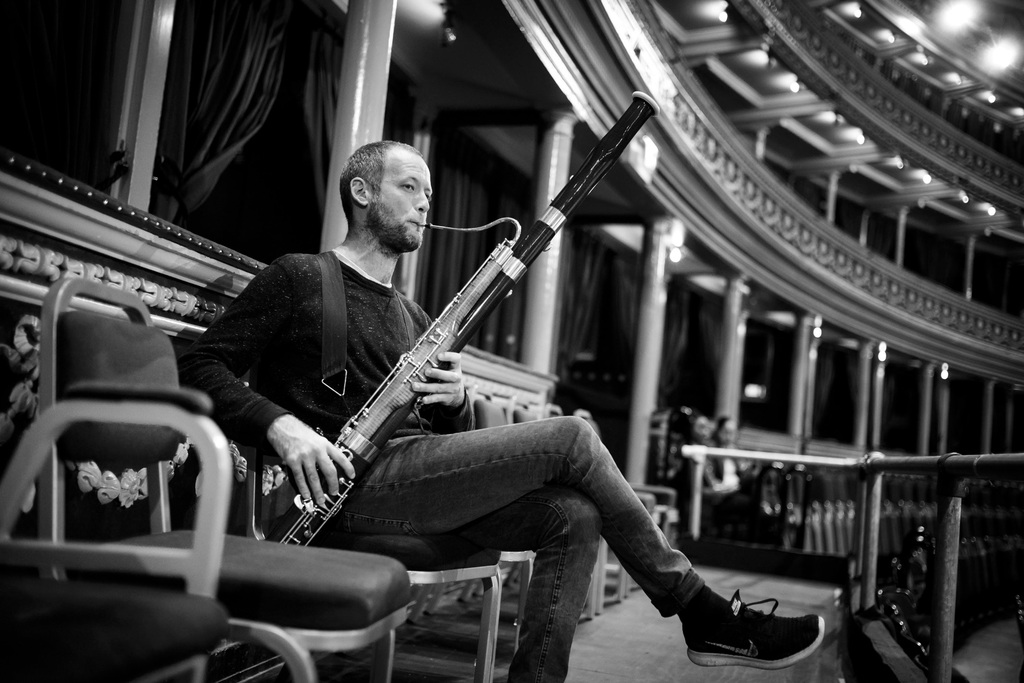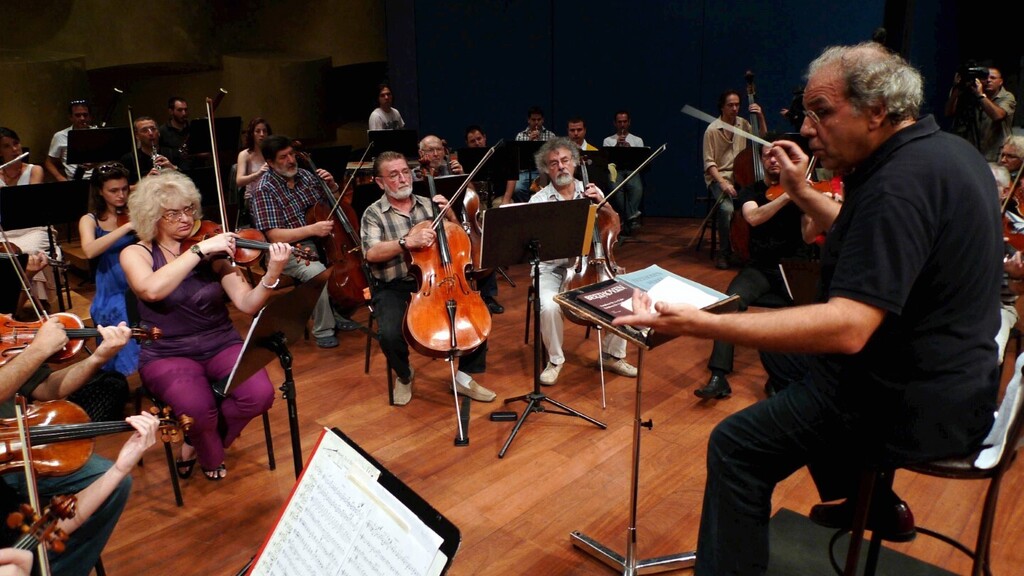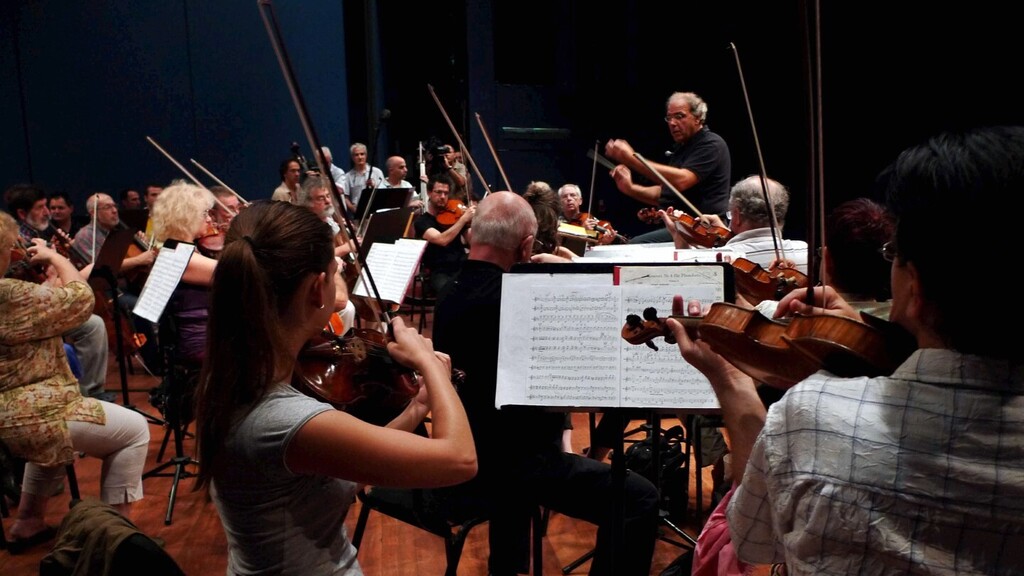The first two concerts of the current Israel Camerata Jerusalem season may have been completely unrelated to each other, but each was quite noteworthy -- and extremely enjoyable -- in its own right.
The concert season -- the orchestra’s 38th -- commenced last month with the first installment in the ICJ’s InstruVocal Series. The current season is scheduled to run through June, 2022.
The opening concert, under the baton of ICJ founder and permanent conductor Avner Biron, revolved primarily around the theme of Le Bourgeois Gentilhomme, the amusing comédie-ballet by 17th-century French playwright Molière. Two of the evening’s three pieces in the program were devoted to The Middle Class Aristocrat, as the musical play is known in English.
The first of these pieces was Suite from Le Bourgeois Gentilhomme by Jean Baptiste Lully, the original composer for the earliest productions of Molière’s timeless work, given at the theatre of the Palais-Royal in Paris in 1670. What made this ICJ performance exceptional was the enlightening narration by Benny Hendel, who provided an introduction and context to the work, before playing his role as narrator of the plot. Without his comments punctuating the five movement’s of Lully’s suite, the evening would have lost much of its lustre.
The lone piece in the program not connected with the evening’s theme was Gianchino Rossini’s Concerto for Bassoon and Orchestra, starring guest artist Mor Biron, an Israeli musician living and working in Germany. The expressive soloist, who played with a twinkle in his eye, gave a virtuoso performance of a work that is all too rarely heard on an Israeli concert stage.
The final piece was Suite from Le Bourgeois Gentilhomme, op. 60, by German composer Richard Georg Strauss. This suite, composed a full four centuries after the play’s theatrical premiere in France, accompanied a 20th-century revival of the work in Germany. This version of the suite comprised eight movements, whose alternately lively, slow, dance and march tempos reflect the plot as it unfolds. Strauss’ score also served as the inspiration for a number of ballet performances, as late as the 1970’s.
Multi-Piano: Two Pianos, 40 Fingers
The Israel Camerata Jerusalem ended October with the first of the orchestra’s La Tempesta dei Solisti series -- on this occasion, actually multiple soloists: four pianists making up the Multi-Piano Ensemble. This particular concert was conducted by guest conductor Roi Azoulay.
Principal pianist Tomer Lev of Multi Piano assumed the role of Master of Ceremonies for the evening, introducing the four piano pieces that would be played. According to Lev, not only are these works for two pianos and orchestra rarely performed today, but also many of the original manuscripts had even disappeared over the centuries, necessitating recent completion and/or re-orchestration.
The first case in point was the opening Larghetto and Allegro for Two Pianos and Orchestra by Wolfgang Amadeus Mozart. The work was composed in 1781, just before the young genius turned his energies to composing more lucrative operas, thus abandoning the genre of double concertos.
Lev took it upon himself to complete what was missing in the original manuscript; and to his credit, to the less-than-expert ear, it was impossible to detect where the Mozart left off and Lev took over. The Larghetto-Allegro was performed in concert by Lev along with the one of his three Multi-Piano colleagues who rotated as his partners throughout the evening: Nimrod Meiry-Haftel, Berenika Glixman and Alon Kariv.
This was followed by Mozart’s Concerto No. 10 for Two Pianos and Orchestra, K. 365. The concerto adhered to the usual three-movement format, although without the usual adagio: Allegro, Andante and Rondo.
Next was a work by Frederic Chopin, written when the young composer was only 18 years old: Rondo for Two Pianos and Orchestra, Op. 73. As Lev explained, Chopin never wrote a concerto for two pianos, but this rondo is similar to the rondo in his first piano concerto.
The version performed by the Israel Camerata Jerusalem was arranged by Lev in collaboration with Arie Levanon -- at 90 years of age, now one of the deans of Israeli conductors and composers. Chopin’s lively rondo was punctuated with mellow interludes and concluded with a stormy finale.
Following the intermission -- a welcome return to a custom that had been abandoned since the outbreak of the pandemic, although no refreshments were offered for sale -- the ICJ performed one work without any piano involvement: Edvard Grieg’s Suite in Old Style, Op. 40, “from Holberg’s time.” The five-movement suite includes some tempos rarely performed: Praeludium, Sarabande, Gavotte, Air and Rigaudon.
The final piece of the concert was the result of an 1833 collaboration between Felix Mendelssohn and [his teacher] Ignaz Mosheles: Fantasie Brillante and Variations for Two Pianos and Orchestra. This work was another special project of Multi-Piano, which Lev says is one of the few ensembles in the world in possession of the notes from the original manuscript -- which had apparently been forgotten for generations until it was recovered by the famous pianist Arthur Rubinstein.
The Mendelssohn-Moscheles composition had been inspired by the work of fellow German composer Carl Maria Friedrich Ernst von Weber, and includes within it a Gypsy March, thus adding another intriguing dimension to a concert that was full of pleasant revelations.
The next series of concerts featuring the Israel Camerata Jerusalem will star the winners of the recent International Rubinstein and Chopin piano competitions, who will appear together on one stage (Nov. 13-15, in Zikhron Yaakov, Tel Aviv and Jerusalem).




